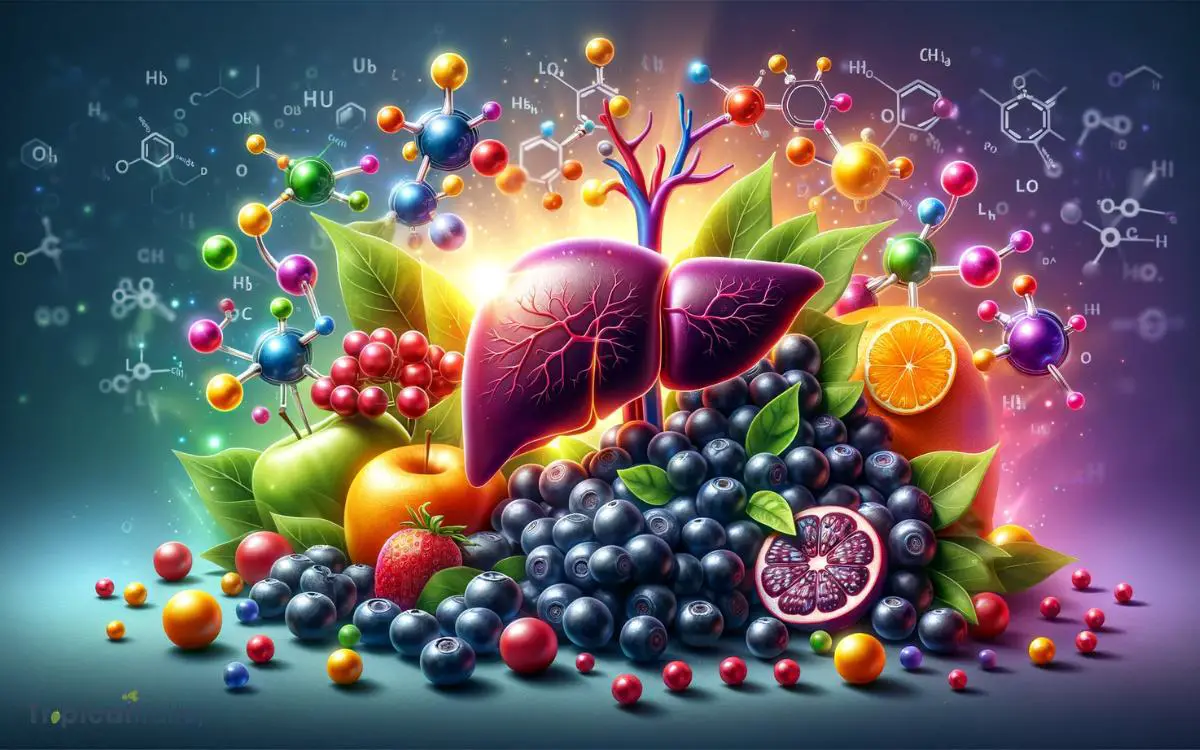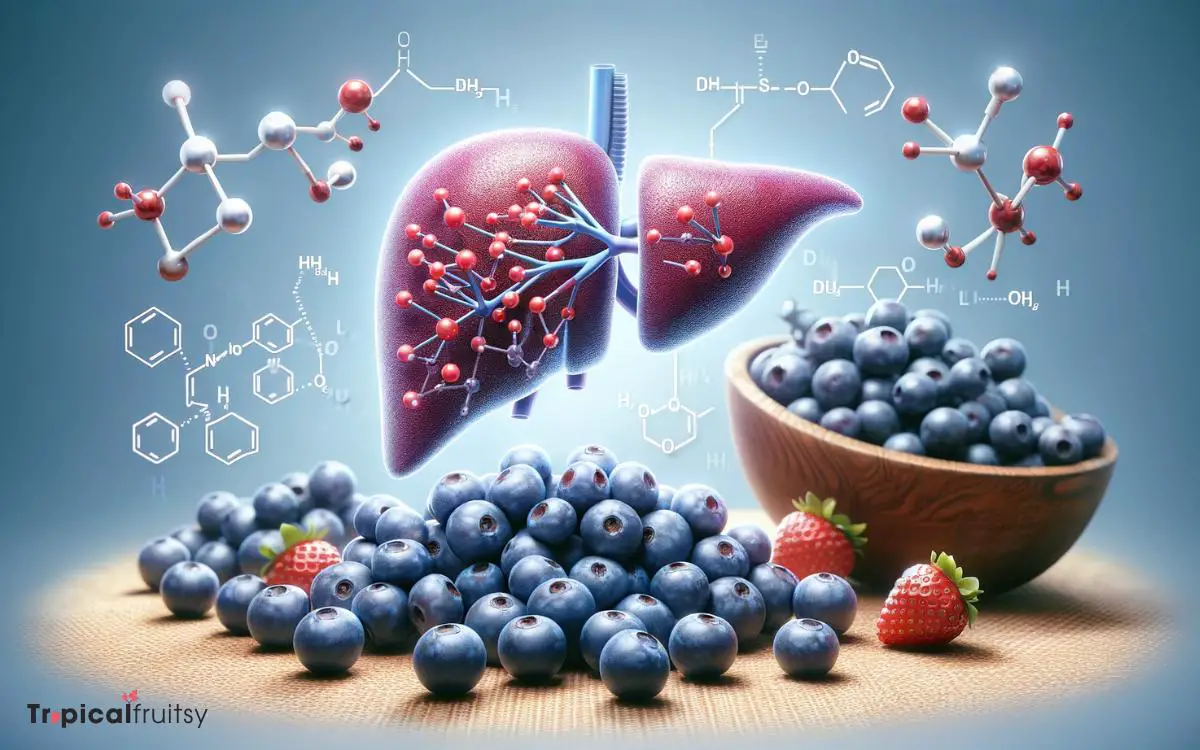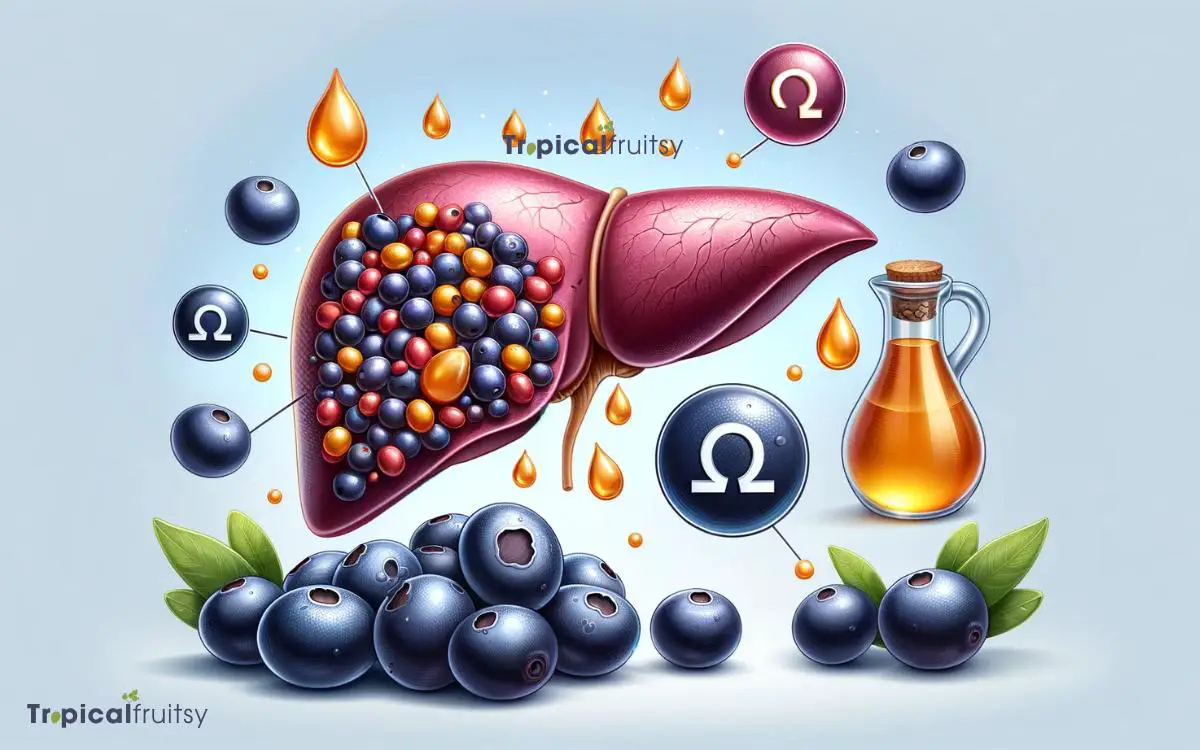Acai Berry Benefits for Liver: Need to Know!
Acai berries are increasingly recognized for their liver health benefits, due to their high antioxidant content, anti-inflammatory properties, and essential nutrients.
These benefits include aiding detoxification, protecting against liver damage, and promoting cellular repair, thus making acai berries a valuable food for liver support.
The acai berry’s impact on liver health can be attributed to several key components:
Integrating acai berries into your diet could help maintain a healthier liver, thanks to their protective and restorative properties.

Key Takeaway
Acai Berry Benefits for Liver Health: Nutrient Contributions
| Nutrient | Benefit for Liver |
|---|---|
| Antioxidants | Reduces oxidative stress, protecting liver cells |
| Anti-inflammatory Agents | Alleviates liver inflammation, reducing fibrosis and cirrhosis risk |
| Essential Amino Acids | Supports liver metabolism and cellular repair |
| Fatty Acids | Maintains cell membrane integrity and liver function |
| Detoxification Support | Aids in the liver’s detoxification processes |
Rich Antioxidant Profile
The acai berry’s dense concentration of antioxidants plays a pivotal role in supporting liver health by neutralizing harmful free radicals.
This superfruit is particularly rich in anthocyanins, a type of flavonoid with potent anti-inflammatory and antioxidant properties.

Scientific inquiry into the effects of anthocyanins has shown that they can significantly mitigate oxidative stress, thereby potentially reducing the risk of liver diseases associated with chronic inflammation and cellular damage.
Moreover, acai berries contain other phytochemicals, such as ferulic acid and catechins, which further contribute to their antioxidant capabilities.
These constituents have been observed to exhibit hepatoprotective effects in various studies, suggesting a synergistic action in maintaining liver function.
The liver’s exposure to oxidative agents is incessant, making the acai berry’s antioxidant profile particularly valuable for hepatic preservation.
Anti-Inflammatory Properties
Following the exploration of acai berry’s rich antioxidant profile, it is crucial to examine its anti-inflammatory properties that further fortify liver health against chronic diseases.
The anti-inflammatory actions of acai berries are attributed to their bioactive compounds, which can modulate inflammatory responses within the liver.

Here is a breakdown of these properties:
- Inhibition of pro-inflammatory cytokines: Acai berries help to reduce the production of cytokines that contribute to inflammation.
- Suppression of COX-2 enzyme: By inhibiting this enzyme, acai berries prevent the synthesis of pro-inflammatory mediators.
- Modulation of NF-κB pathway: This critical inflammatory pathway is downregulated by compounds found in acai berries.
- Decrease in immune cell infiltration: Acai’s components can reduce the recruitment of immune cells that exacerbate inflammation.
Understanding these mechanisms lays the groundwork for discussing how acai berry’s amino acids may influence liver function.
Amino Acids and Liver Function
Numerous amino acids present in acai berries play a pivotal role in supporting liver function and repair.
Amino acids are fundamental components for synthesizing proteins essential for the maintenance and regeneration of liver tissue.

The liver is responsible for various metabolic and detoxification activities, and amino acids contribute to these processes by facilitating enzyme function and cellular transport mechanisms.
| Amino Acid | Function in Liver | Found in Acai Berries |
|---|---|---|
| Arginine | Precursor for urea | Yes |
| Glutamine | Ammonia detoxification | Yes |
| Methionine | Antioxidant synthesis | Yes |
| Taurine | Conjugation of bile acids | Yes |
| Glycine | Gluconeogenesis and bile salt formation | Yes |
These amino acids support the hepatic function by aiding in the clearance of ammonia, producing antioxidants, contributing to the synthesis of bile salts, and supporting overall metabolic processes within the liver.
Essential Fatty Acids Role
Essential fatty acids found in acai berries further augment liver health by supporting cellular membrane integrity and inflammatory responses.

These polyunsaturated fats, particularly omega-3 and omega-6 acids, are pivotal in maintaining the liver’s functional and structural efficiency.
The role of essential fatty acids in liver health can be categorized as follows:
- Membrane Fluidity: Omega-3 fatty acids contribute to the fluidity of hepatocyte membranes, facilitating essential nutrient and enzyme activities.
- Inflammation Modulation: They help attenuate hepatic inflammation, which is crucial in preventing chronic liver diseases.
- Lipid Regulation: Essential fatty acids are involved in the synthesis and breakdown of triglycerides, reducing the risk of fatty liver disease.
- Cell Signaling: They play a role in signaling pathways that regulate liver cell growth, differentiation, and apoptosis.
An evidence-based approach underlines the necessity for a balanced intake of these nutrients to optimize liver function.
Detoxification Support
The liver’s detoxification process may be supported by the bioactive compounds present in acai berries, which have been shown to enhance hepatic function.
These berries are particularly rich in antioxidants, which can mitigate oxidative stress and assist in the neutralization of toxins.

Consequently, the consumption of acai berries might contribute to a reduced burden of toxin overload in the liver, promoting overall hepatic health.
Enhancing Liver Function
Acai berries have been shown to support liver function by aiding the organ’s natural detoxification processes.
This fruit’s potential benefits are attributed to its high antioxidant content, particularly anthocyanins, which are known to exert a protective effect against oxidative stress.
The liver’s role in filtering toxins from the blood is critical, and the nutritional components of acai may enhance this function through several mechanisms:
- Promotion of Hepatocyte Integrity: Anthocyanins in acai berries may help maintain the structural integrity of liver cells, supporting their detoxification capabilities.
- Stimulation of Detoxifying Enzymes: Acai consumption could upregulate the production of enzymes responsible for neutralizing toxins.
- Reduction of Inflammation: The anti-inflammatory properties of acai berries may improve liver function by reducing inflammation-induced stress on hepatic cells.
- Enhancement of Antioxidant Defenses: Acai’s contribution to the body’s antioxidant defense system supports the liver in handling the oxidative aspects of detoxification.
Antioxidant-Rich Detox Aid
Numerous studies suggest that the abundant antioxidants in acai berries, including flavonoids and anthocyanins, provide significant support for the body’s detoxification systems, particularly within the liver.
These phytochemicals are known to exert a protective effect by neutralizing harmful free radicals and supporting the synthesis and activity of liver enzymes involved in detoxification pathways.
The biochemical actions encompass a range of processes from reducing oxidative stress to enhancing the elimination of toxins.
Scientific analysis reveals that such compounds can modulate liver function to bolster the organ’s resilience against the daily influx of environmental and dietary toxins. This facilitation of hepatic detoxification is an essential aspect of maintaining systemic health.
Transitioning to the next focus, acai berries may also play a crucial role in reducing toxin overload, further fortifying the liver’s defenses.
Reducing Toxin Overload
One cannot overlook the role of acai berry consumption in reducing toxin overload by bolstering the liver’s natural detoxification processes.
The liver, being a primary detoxification organ, benefits from the nutrient-dense profile of acai berries, which may enhance its ability to filter harmful substances.
This is supported by several key components:
- Polyphenolic compounds in acai berries can upregulate phase II detoxification enzymes, facilitating the neutralization of toxins.
- The high fiber content aids in binding and eliminating toxins through fecal excretion.
- Acai’s anti-inflammatory properties may reduce hepatic inflammation, thus optimizing detoxification pathways.
- Omega fatty acids present in acai help maintain cell membrane integrity, crucial for efficient intracellular detox processes.
The significance of these factors lies not only in detoxification but also in the subsequent protection against liver damage.
Are the Liver Benefits of Acai Berries Different from Blueberries?
Yes, the acai berry vs blueberry difference in liver benefits is quite distinct. Acai berries are known for their high antioxidant content, which can help protect the liver from damage. On the other hand, blueberries are praised for their anti-inflammatory properties, which can also contribute to overall liver health.
Protection Against Liver Damage
Studies suggest that consumption of acai berries may offer a protective effect against liver damage through their potent antioxidant properties.
These berries are rich in anthocyanins, a type of flavonoid with strong antioxidative capabilities that can neutralize free radicals and reduce oxidative stress.

Oxidative stress is a known contributor to liver pathology, including non-alcoholic fatty liver disease (NAFLD) and cirrhosis.
The liver’s central role in detoxification processes exposes it to high levels of potentially harmful substances, necessitating robust antioxidant defenses. Acai berries’ contribution to these defenses may thus be significant.
Current research, focusing on cellular models and animal studies, indicates that acai berry extracts can inhibit the activation of hepatic stellate cells, a key event in the progression of liver fibrosis, highlighting its potential in liver health management.
Conclusion
The acai berry’s rich composition, featuring antioxidants, anti-inflammatory agents, amino acids, and essential fatty acids, provides multifaceted support to liver health.
Evidence suggests these components facilitate detoxification processes, enhance liver function, and offer a protective shield against hepatic damage.
A case study highlighting a patient’s improved liver enzyme profile after consistent acai supplementation exemplifies the potential therapeutic impact of this superfruit on liver health.
Further research is warranted to solidify these findings.






